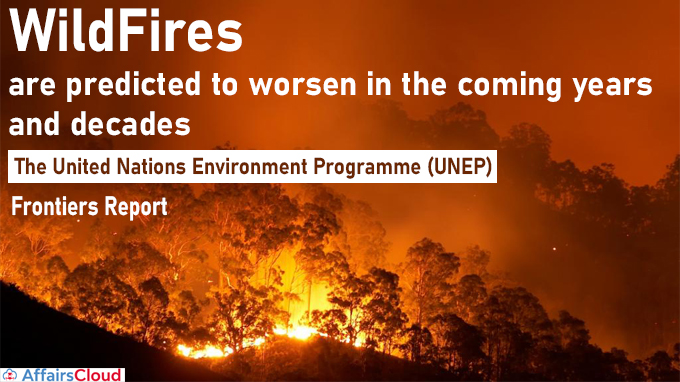
On 17th February 2022, the United Nations Environment Programme (UNEP) released the 4th edition of Frontiers report titled “Frontiers 2022: Noise, Blazes and Mismatches – Emerging Issues Of Environmental Concern” which predicts that wildfires will worsen in the upcoming years and decades. The report states that wildfires are becoming more frequent, larger, and more intense due to climate change.
- The report has attributed this to climate change and human activities.
About Frontiers:
i.The Frontiers reports of UNEP identify and draw attention to the emerging issues of environmental concern. The Frontiers report was first published in 2016.
ii.The Frontiers 2022 report has identified the 3 most important environmental issues that have emerged due to climate change: wildfires, noise pollution, and shifts in the biological life cycles of plants and animals.
iii.The 3 chapters of Frontiers 2022 are,
- Listening to Cities: From Noisy Environments to Positive Soundscapes
- Wildfires Under Climate Change: A Burning Issue
- Phenology: Climate Change Is Shifting the Rhythm of Nature
Wildfires:
i.A wildfire is a free-burning vegetation fire, including fires that can pose a significant risk to social, economic, or environmental values.
ii.The trends towards wildfires are likely to increase due to the mounting concentrations of atmospheric greenhouse gases and the attendant escalation of wildfire risk factors. These extreme events are catastrophic for human health and the environment.
Wildfire affected region:
i.Between 2003 and 2016, a total of 13 million individual fires (lasting for 4-5 days) have occurred. The Savannah (mixed woodland – grassland) ecosystem accounts for 77% of these.
ii.Between 2002 and 2016, an average of about 423 million hectares(4.23 million square km) of the earth’s land surface was burnt every year.
iii.According to the report, around 67% of the annual global area burned by all types of fires was in Africa.
Prevention & Management:
The report highlights that wildfire prevention, response and management call for improved planning and policies coupled with practices. It also states the importance of enhancing fire-fighting capabilities and strengthening community resilience-building programmes to prevent wildfires.
Recommendations:
To improve the monitoring and management of wildfire, the report recommends the following,
- Appreciating and adopting indigenous fire management techniques
- Focus on long-range weather forecasting
- Focus on remote-sensing capabilities such as satellites, ground-based radar, lightning detection as well as data handling
Recent Related news:
During the ongoing 2021 United Nations Climate Change Conference, aka COP26 (Conference of Parties) in Glasgow, Scotland, a report titled ‘The Adaptation Gap Report 2021: The Gathering Storm’ by United Nations Environment Programme (UNEP) was released. It was the 6th edition of the Adaptation Gap Report.
- The report states that if the world limits warming to 1.5°C, many climate risks remain and will be irreversible.
About United Nations Environment Programme (UNEP):
Executive Director- Inger Andersen
Headquarters– Nairobi, Kenya




